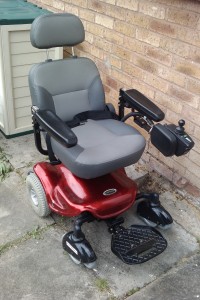 I have been given a power wheelchair that used to belong to my wife’s grandfather. I am very grateful to my wife’s grandmother for giving it to me. It will be very useful when I have to go to the local shops, or be somewhere where I am expected to stand around or stay on my feet a long time. It will also mean that I can go to protest rallies which I has so far been left out of. I have a problem though. I have a very large psychological barrier to actually using it.
I have been given a power wheelchair that used to belong to my wife’s grandfather. I am very grateful to my wife’s grandmother for giving it to me. It will be very useful when I have to go to the local shops, or be somewhere where I am expected to stand around or stay on my feet a long time. It will also mean that I can go to protest rallies which I has so far been left out of. I have a problem though. I have a very large psychological barrier to actually using it.
So what is the problem stopping me using it? Put simply, fear. Fear of what people will think and say, and embarrassment at people seeing me in it. I have previously written about similar problems with using my walking stick in my blog post Embarrassed to be me, where I talked about fear of abuse as well as fear of people thinking that I use a stick to look more ill and claim extra benefits. With a chair, I have an additional fear that people will think I am trying it on because they have seen me walking. My neighbours will have seen me in various different levels of health; on my best days they have seen me stand for a couple of minutes talking, and stroll across to the car park, get on my motorbike and ride away. More often, they have seen me walk using a stick, sometimes leaning on it more heavily than others. Now, they will also see me leave the house in a chair. To people that know me it is obvious that I have a variable condition that leaves me less able to move or stay upright the more tired I am or the more pain I am in. To people that see me away from the house, I worry that they won’t understand this and will simply think that I am faking my illness to get money from the government. I also worry about abuse if I stand up from the chair for a bit - I don’t have to stay in it all the time, but some people seem to think if a person can walk at all then they should always walk.
I also have a problem using the wheelchair, and, indeed, the stick, because I tend to be stubborn about what I can do. I start out in little pain and able to stand and walk, so I insist on going out without mobility aids. It doesn’t take long for me to start falling over because of exhaustion and pain though. Sometimes I can manage more than other times, and so I can quite often be capable of walking to the village shop, perhaps with a stick, and maybe walk back again too without too much pain, but the payback afterwards is high. I should use a wheelchair in this situation because that way I won’t exhaust myself just from going out to buy milk and won’t have to spend such a long time resting to recover.
When I talked about my concerns on twitter a friend sent me a link to this blog post which summarises the problem nicely. The writer has help at home with tasks like showering and dressing, yet she tries to do these things herself anyway.
“So last Thursday, when I had to explain it all over again, I told her that I *can* do all those things, but that I had to pay a price for it. And I showed her that my wrist was dislocated because of the transfer I just made. And then she said the most wonderful thing. She said: “but if your joints dislocate when you do something, that means you can’t do it right?” And she was so right…”
The problem is that she can complete these tasks, but the result of doing so is pain or even dislocation. I can walk to the shops (sometimes!) but the result of doing so is pain and exhaustion, leaving me helpless for some time afterwards.
Today I took my new powerchair out to the local shops for the first time. It’s not far, just five minutes walk away, but it’s a big step (roll) forward in making myself use the chair. I was worried through the whole journey, worried about what people would think, but I think I am getting there. I intend to use the chair to make local trips a few more times, and then I will take it out to the protest in either Birmingham or London on the 30th. I hope I will get over my fear by then.
Related links
Rise in abuse of disabled people is shocking but not surprising
A new definition of being able

